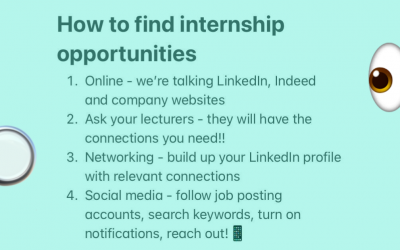Are you a student looking to earn some money and gain valuable real-world industry experience? Well yeah, that would be great, right? If so, a paid internship could be just what you need. We’re going to spill the beans and tell you everything you need to know about paid internships, from what they are to how to find them, and why they are so useful for students and grads.
What Is a Paid Internship?
A paid internship is a short-term period of work experience typically offered to students and graduates who want to gain new skills and industry experience while being compensated for their work. Many companies still offer internships on a voluntary basis for students to gain hands-on experience while they provide a helping hand in completing work (which basically means you’ll be performing all the standard intern duties but without any kind of payment, and that’s gross).
When Should You be Paid for an Internship?
Although unpaid internships are still common (unfortunately), they are becoming less common due to a number of regulations that require companies to pay for their internships in certain situations. For example, employers must pay you the national minimum wage if:
- You have a work contract that outlines the project you will be working on
- They promise you a contract for future work
- You must turn up to work, even if you don’t want to go
There are instances where internships do not require a wage or national minimum age, for example:
- If you’re a student in a UK-based higher education course, and the course requires you to complete an internship for less than one year
- If you’re a work experience student in compulsory education
- If you’re a volunteer working for a charity
- If your internship only involves shadowing an employee
It pains us that we even have to say this but it’s important to check the gov.uk website and make sure you’re not being played or underpaid. Or you could simply sign up to receive our PAID internship alerts and rest assured that we’ve got you covered.
Why Are Internships Valuable?
Financial Support:
You’ve probably guessed it but a paid internship is really valuable for a student needing financial support during university or a recent graduate looking for experience before a graduate role. This extra cash can help offset the cost of rent, food, travelling expenses and even just help you finance your nights out (ubers are expensive and why does a vodka lemonade cost an arm and leg?!)
Real-World Experience:
An internship gives you hands-on experience to develop practical skills, allows you to gain a deeper understanding of an industry and helps you stand out to potential employers.
Networking Opportunities:
Internships are one of the BEST ways to connect with professionals and potential future employers. Building a network early on can make it ten times easier to land a graduate role.
How to Find Paid Internships
Let’s dig in to how you can find a paid internship as a student or graduate.
Us (obvs):
We need to tell you about our amazing (no, we’re not biased) paid, flexible and remote internship opportunities. At The Grad Soc, we partner with companies to make sure you get the best experience possible, from working remotely and flexibly to receiving 2-4 weeks of training beforehand and consistent support from our expert team throughout. Not only do we want to give you the best opportunity, but we also want to pay you well. We pay every intern above NMW at £11 per hour! If you want to know more about our internships, you can sign up here or check us out on socials.
Career Services:
Most universities have career services departments that can help you find internship opportunities. They usually have connections sharing the latest job opportunities, a job board to search through as often as you need and career advisors who are happy to help.
Online Job Boards:
Websites like LinkedIn and Indeed are great places to search for internships. You can filter your search by location, industry, and whether the position offers payment or is unpaid.
Company Websites:
Most companies will post internship openings on their own websites or their LinkedIn page. This is why it’s really useful to have a good idea of who you want to work for and make sure you’re following them and engaging with their content regularly. If you have a specific company in mind, check their careers or internship section regularly.
Networking:
We know, we know, you’ve probably heard this a million times but don’t underestimate the power of your professional network. Let friends, family, lecturers and tutors know you’re looking for an internship. They may have leads or connections that can help you. Reaching out to people on LinkedIn is another great way to network – if you need help starting, check out our free connection request templates and book a virtual LinkedIn profile review today.
Tips for a Successful Paid Internship
Once you’ve secured a paid internship, here are some tips to make the most of the experience:
- Set Clear Goals: Know what you want to achieve during your internship and what your employer expects you to achieve. Discuss your goals with your manager regularly so they can help you work toward them. This also demonstrates that you have drive and focus, both of which will help you impress!
- Be Proactive: Don’t just wait for tasks to be assigned to you, especially if you find yourself with time to spare. Volunteer for projects, ask for more work, ask questions and show your enthusiasm for learning about the work and company.
- Get Chatting: Make an effort to connect with the whole team and make an effort to turn up to company events. At The Grad Soc we have regular virtual tea breaks (don’t worry if you’re not a tea person, you can bring your Pepsi Max too) and interns that regularly show up are those who tend to connect more with the team. Not only does this help you to expand your professional network, but it demonstrates a real effort to become part of the company.
- Ask for Feedback: Ask your manager for feedback regularly. You can even ask the rest of the team for feedback too! This shows that you’re eager to improve and grow in your role. Check out our blog on how to handle negative feedback if you want extra pointers (just in case!)
- Learn from Failure: Don’t be afraid to make mistakes. Everyone starts somewhere. Failure can be just as, if not more so, valuable than success.
As you can tell, paid internships are really valuable. Not only do they allow you the chance to earn a little extra to fund a uni social life, but you also gain practical experience and develop your CV. What are you waiting for? Go on, get out there and start searching.











